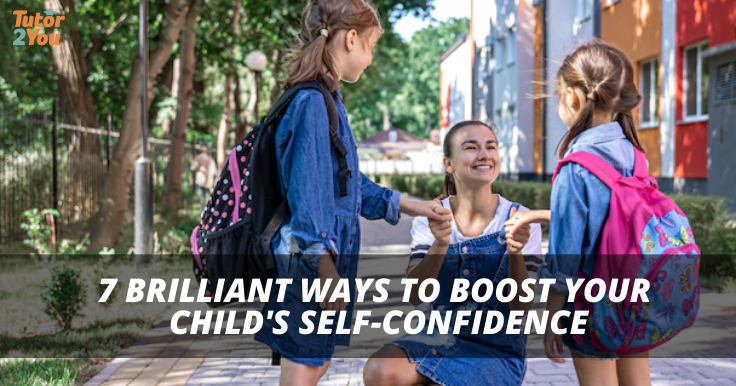
7 Brilliant Ways to Boost your Child's Confidence
“Believe you can, and you are halfway there,"
said Theodore Roosevelt the youngest American president.
These interesting words from this young president are the essence of self-confidence. He was the youngest candidate, at the age of 42, to become a president. These words must have carried him far on his journey to running the United States of America at the beginning of the 20th Century.
If you take these words to heart and use the following seven points to encourage confidence in your child, you should be halfway to success, and your children can take up the challenge and go further.
Self-confidence is one of those qualities in life that give children the edge in exploring their talents and fulfilling their dreams.
Here are 7 strategies to use to boost your child's self-confidence

1. Let your child make decisions
Deciding on the little things in your child's day-to-day routine is a great start towards being able to make a stand on the bigger things later in life. An excellent way to start is with a selection of options. Choose this or that, and then stick by your decision. Parents can support these decisions, and if the outcome is not what your child expected, there is a lesson to learn.
Initially, make sure your child knows there are some areas where adults still make decisions, and that is because they have the child's welfare in mind. Discussions on decision-making are an excellent family topic and one that helps build confidence and understanding.
2. Don’t ‘Rescue’ your Child. Making mistakes is part of growing in confidence
Making mistakes is directly related to making decisions. Children who are encouraged to make decisions may ultimately make mistakes, and these go with the territory of gaining self-confidence. Mistakes may come in all shapes and sizes, but lessons learned from making mistakes, and facing the consequences, help children gain confidence in themselves. Fixing everything so children never have a chance to be an overcomer does not build self-confidence.
3. Encourage an optimistic attitude to life
Children who can focus on good positive outcomes can cope with disappointment and self-doubt. If your child feels disappointed in the result of a situation at school, help them with ways to look at the glass as half full instead of half empty. Parents often feel the same disappointment their child feels and then transfer their negative reaction onto their child. Blame shifting, negative comments, and not facing reality are reactions that do not encourage confidence.

4. Teach your child to solve problems
Problem solvers can increase confidence in themselves. Help your children to find solutions that will work in their favour. Discuss issues openly with them and the reason behind their decision together with the possible outcome. A child who can solve problems and feel a sense of positivity, as a result, will have the confidence to try and solve the next problem.

5. Help your Child to Find Special Interests and Explore them
Hobbies, outdoor activities, and extra interests outside of school are great forums for building self-confidence. Encourage your child to pursue an extra activity they enjoy. It gives them a new area of exploration. They will meet new friends and have to leave their comfort zone. Finding something else to be excited about is a good way to build confidence.
6. Encourage Responsibilities and Helping Others
Children who are outwardly focused and try to help others become more confident. Helping others less fortunate than yourself helps you to be more confident in your abilities as the other person is focused on getting your help and you are involved with caring for someone else.
7. Choose your Compliments with Care
Yes, children need encouragement but dishing out a high five or good job comment at every possible moment undermines the compliment. Excessive complimenting does not encourage the child to feel that surge of pride and self worth.
Young children will happily accept every little moment of reaffirming However, as children get older they realise what it means to genuinely give encouragement. Rattling off praise for something you expect to be done, like brushing teeth will not encourage confidence.
Over complimenting weakens the power of the compliment. Encourage confidence by being specific about an area you see is notable and well done, a real achievement. Obviously this is something you as parents monitor best because you know your children.
The Bottom Line: Building self-confidence is an ongoing part of parenting
Children who feel this self-confidence feel good about themselves and are willing to try new things. They are more likely to succeed at school and in life in general.
Confidence is a very important element of maturing and growing up and being able to thrive in society today.
Tutoring is not just for improving academic grades, but also for increasing self-confidence through series of proven strategies and personalised learning
If your child requires some additional support may it be in-home or online, we're here to help! Book for a free consultation with our trained & certified tutors today.


